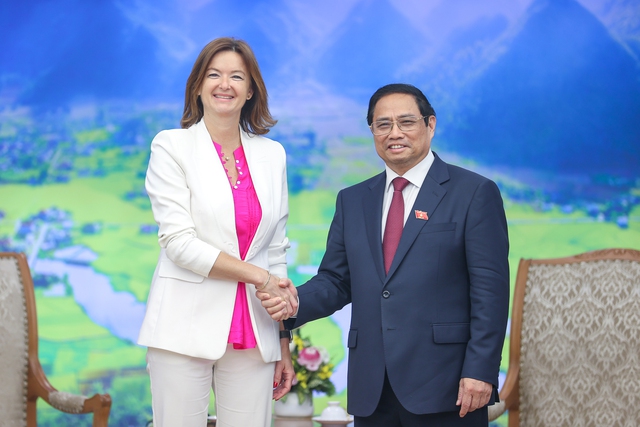Slovenia regards Viet Nam as leading important partner
VGP - Slovenia wants to foster its cooperation and traditional friendship with Viet Nam, a leading important partner of Slovenia in the region, said Slovenian Deputy Prime Minister and Minister of Foreign and European Affairs Tanja Fajon.

Prime Minister Pham Minh Chinh (R) shakes hands with Deputy Prime Minister and Minister of Foreign and European Affairs Tanja Fajon, May 23, 2023 - Photo: VGP/Nhat Bac
Prime Minister Pham Minh Chinh hosted a reception for the Slovenian Deputy Prime Minister in Ha Noi on May 24.
He hailed the outcomes of the recent talks between the Slovenian official and Minister of Foreign Affairs Bui Thanh Son, and her meeting with Minister of Industry and Trade Nguyen Hong Dien, as well as the Viet Nam-Slovenia business forum in Ho Chi Minh City.
He added that in spite of the COVID-19 impacts last year, the two-way trade turnover fetched a record of over US$ 570 million, up 15 percent from 2021.
He suggested Slovenia further facilitate the access of Vietnamese products like electronics, garments-textiles, farm produce and aquatic products to the Slovenian and EU markets.
The PM used the occasion to call on Slovenia to soon ratify the EU-Viet Nam Investment Protection Agreement (EVIPA) and urge the European Commission (EC) to soon remove its "yellow card" warning against Vietnamese seafood.
In reply, Fajon affirmed that Slovenia expects to cement and deepen its relations with Viet Nam in different domains.
The Slovenian Government highly values Viet Nam’s advantages in terms of market, workforce and business environment, as well as the fact that both nations support free trade.
Slovenian firms are interested in and wish for result-oriented cooperation with Viet Nam, as reflected through the big number of Slovenian companies that have come to the Southeast Asian nation on this occasion to seek cooperation, investment opportunities.
The pair agreed to beef up cooperation at multilateral and regional forums, and cooperate to response to global challenges like climate change, and energy and food crises.
Regarding the East Sea issue, they underlined the importance of ensuring security, safety and freedom of navigation and aviation in the East Sea, and settling disputes by peaceful measures in line with international law, especially the 1982 United Nations Convention on the Law of the Sea (UNCLOS)./.

